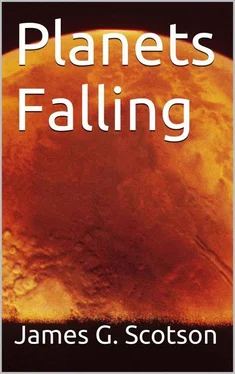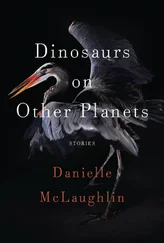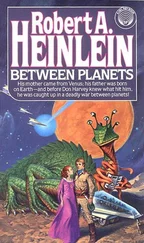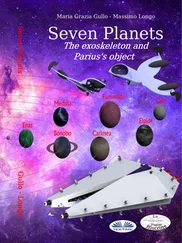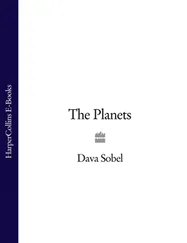James G. Scotson
PLANETS FALLING
To Stephanie, Ian, and Addy. You are my planets.
The old man sat in the shade of a willow tree considering the future. He saw shapes in his mind. They looked a little like stepping stones in a garden or stars suspended in heaven’s bosom. With closer inspection, he discovered that they were footprints in ruddy soil. Those dusty footprints, millions of miles away from his frail frame but also right there in his head, were stepping into a broad, endless horizon. Humanity had begun its journey into the unknown on a scrawny, rusty patch of dirt not far from home, feet shuffling awkwardly on stair steps, moving away from one reality and upward towards another. The man’s head slumped and his red, beating heart fluttered and failed. The bloody disk of mars faded into mist as he slipped away into the darkness of space.
Many years passed. The old man was long gone and the willow tree was a parched trunk — a mere husk of its memory. Melancholy had settled on the human species. Earth was sagging under humanity’s weight. To even the most optimistic, it was apparent that the sack of genes and flesh known as mankind was spiraling towards extinction. In response, desperate planetary exploration within earth’s solar neighborhood was underway. This effort was not one of charity and nobility, but as all things go with people, it was fueled by cold, harsh profit.
The corporations ruled. Mining the water of several planetary moons, siphoning the gases of the giant planets, and scooping the iron of mars were lucrative business. The masses on the blue home world grasped at the dollops of material falling from the sky with desperation. Very little democracy remained. Earth’s governments had congealed into a few factions, each largely glued by a strange mixture of religion, skin color, science, economic interests, and politics.
It was under these conditions that the little planet mars was slowly being colonized. One of those colonists was a dark, thin woman named Pinchot Ferris. Pinchot loved to garden. However, her professional training kept her from this hobby. She had degrees in ecology and biochemistry with a knack for administration. She bristled when people, including many of her fellow scientists, equated the science of ecology with value-laden, emotionally driven environmentalism. Ecology was a robust approach for predicting the course of events within complex associations of plants and animals. Good ecology was necessary for effective environmentalism. But an ecologist had to be dispassionate about environmental events to stay objective — whether the events were positive or, as usual, negative was not an ecologist’s business. An ecologist was responsible for understanding the biological processes on earth not altering them. It was true that ecology had failed to inform policy and regulation on earth. But that wasn’t the fault of the ecologists in her view. How could you stop the colossal momentum of population growth and human greed? As technology grew and more people sank into electronically induced comas, it became simpler for the alert but typically greedy few to sop up the last dregs of resources on the planet.
Given the dismal conditions on earth, some humans looked to the tiny red speck in the sky for hope. Mars was long considered a candidate for escaping the crowds, heat, pollution, and confusion on earth. However, ecological technology, which would form the basis for terraforming embraced in a distant time, was still in its infancy. Colonies on mars were the equivalent of giant plastic and metal greenhouses, available only to the very wealthy. The ecosystem inside the colonies was very simple, very inefficient, and prone to malfunctions. The engineers installed enough redundant systems to keep the domes’ life support stable. But the systems required constant maintenance. The atmosphere outside the domes was cold and lacked oxygen. Some life was discovered on mars’ open surface — all microbial — visible only under a microscope. The debate raged on among the scientists about whether these organisms were of earthen origin or arose separately on mars. Likely, no one would ever know because of contamination by early robotic probes, the human explorers, and then the colonies. No multi-celled plant or animal was known to survive on the open surface for more than a few hours.
Young, fiery Pinchot was hired by the corporation that owned most of the resorts and developments on mars. The task given to her sounded simple enough to the corporate leaders — make the gardens, air, soil, waste, and water in the domes sustainable. The intent of the company was driven by cost control. Reducing maintenance costs and increasing safety would improve the bottom line by eliminating technicians and decreasing insurance premiums. She knew the solution was going to be far more costly than they anticipated. Still, the opportunity for her to tinker was compelling.
She was sitting one day in a shady nook of a faux Japanese garden on the red planet. As she closed her eyes, she recalled the afternoon years ago that she landed on mars. She was strapped tightly into her seat for landing. Her companions in the cabin were mostly tourists adorned in casual clothes feeling a little queasy and turning green. A few others were homesteaders, looking to make a life as service workers, mechanics, engineers, or custodians. Thrusters kicked in and the sickening weight of gravity pulled on her organs. It felt like her eyeballs were sinking into their sockets. The transport thudded and the airlock connected. Air hissed. Her ears popped. And the voice on the speaker announced that they were on mars and ready to be interred.
Her first memory, next to the nausea, was the smell of the dome. It was stale, slightly acrid, and very unpleasant. She stepped into the blaring light and gazed at the sickly potted plant in the corner of the entryway.
“Well, here I am,” she muttered and entered her new life.
The next day, she found her way from her cramped, dreary apartment to her new office and laboratory complex.
“Dr. Ferris, I’m so glad you agreed to join us. I have been following your extraordinary work for years.” Director William Holst extended his hand. A broad smile stretched across his middle-aged face. He was broad shouldered and rugged in a good way. His eyes were the blue of the sky on earth.
She shook his thick hand. “I think we have some real possibility for improvement.” They were in the garden section of the domed colony adjacent to the office facility. Ruddy sunlight shone down onto the vegetation, bestowing it all with a slightly dusky, reddish glow. Butterflies, all yellow swallowtails, fluttered between flowers. A large emerald dragonfly whizzed past her face. A drab brown and white bird, maybe a sparrow, rustled in the leaves of a nearby gingko tree. In the distance, a fountain burbled. She guessed the pond had goldfish swimming in it. Pleasant enough. However, it was clear that not much planning went into the terrascaping.
“First, call me Pinch. No need for formality here. We’re going to need to reconfigure the entire landscape of the colony complex. The garden needs to be extended throughout the domes. We need an entirely different set of animals and plants. I also have ideas about how to tighten up the hydrology. The air quality here completely stinks — I mean that literally. There’s an imbalance in the gas concentrations that we must address.”
Will chuckled. “Okay. Assemble your team and begin drawing up a master plan. You have a considerable expense account at your dispense. I’m excited to see how you use it. You’re exactly what I was hoping for.” He winked, scratched his forehead, and departed so quickly she swore he made a whooshing sound.
Читать дальше
